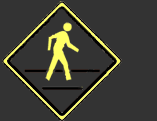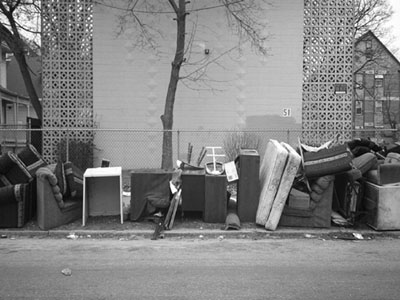-PROVFLUX ARTIST-
Curb Appeal
by Betsy Coulter
What secret appeal lies at the side of the road?
The roadside is a primitive site in the urban landscape, a marker of our humble beginnings as civilized people, a reminder of the eternal struggle between order and entropy, and a primary site of exchange. Social order begins where property is divided. We build a home, we draw a line around it, and we make a space our own. If we have something to sell or barter we might set up a stand at the side of the road to capitalize on the passing traffic. As dwellings spring up side-by-side and footpaths turn into roads the dividing line between private and public space becomes concretized in the form of fences, hedges, walls, sidewalks, and curbs.
The edge of the road is a no-man’s land. We go there to lose ourselves in hot merchandise, ice cream, cheap sex, fresh fish, drugs, and incense. Dirty deals and sugarcoated propositions are made while we pass in our cars. Animal bodies find their way there, the same as bare-footed can collectors. There are a million stories of drunken bums who drown in shallow gutters. The side of the road is a gutter in our imaginations. We try to fill it with super size containers, hoping to win it over with the charm of fast food logos. The roadside is a mirror that reflects a broken image back to us, and we despise it for this. We spit in it, leave our dirty diapers there, throw down our losing lottery tickets, and move on.
“Curb appeal” is a desirable attribute, much like white teeth. Garbage finds its place at the curb and becomes invisible to most passers-by, but debris breaks through on occasion: a colorful object, or a child’s toy (just like the one we had), or a perfectly fine looking cabinet (just needs some fresh paint). There is also a strange reassurance that comes from seeing what our neighbors throw away. Their tastes and habits are made visible by the things they expel and we glance with morbid curiosity. For some, a territorial urge causes them to keep a watchful eye over their garbage pile. They scorn the garbage picker, their only ally being the Garbage Man who takes their objects to a better place. We are taught that self-respecting individuals do not touch trash. Taboos are in place to keep us at a respectable distance from other people’s garbage. Through their intimate association with our filth, garbage pickers become invisible on the curbside. Sunday garbage pickers in their mini-vans and Lexus cars may never reach that state of transparency. They get high on the thrill of stepping out of line, but may never be at one with the objects they pick-up.
The side of the road opens up a space of possibilities for people and things. Some enter this space in a downward spiral and never leave it, carrying it with them like a bad odor. For others, the curb is a place for business offering low overhead and a constant flow of traffic. The American Stock Exchange was called “The Curb” in the 1800s when it was nothing more than “curbstone brokers” buying and selling securities on the sidewalk. Objects go to the curb to die and be re-born at the hands of garbage pickers. Everyday homeowners feel good about themselves when a needy family drags off their old TV. Bereaved relatives erect shrines marking the location of a loved one’s last breath. Kids chase stick boats down the gutters in springtime. Road crews, street cleaners, cops, and concerned citizens work to impose order on this unruliest of sites. The Travis Bickles (Taxi Driver) of this world keep praying for a deluge to wash it all away.
Betsy Coulter was born in London, Ontario, Canada. She received her B.F.A.
from the University of Western Ontario in 1997, and her M.F.A from the University
of Guelph, Ontario in 1999. She participated as an artist in residence in
the Core Program at The Museum of Fine Arts, Houston from 2000-2002. She currently
lives and works in Providence, Rhode Island. Her found-object snapshots and
sculptures have been exhibited in the U.S and Canada.

